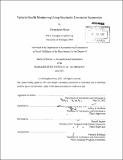Vehicle health monitoring using stochastic constraint suspension
Author(s)
Rossi, Christopher, S.M. Massachusetts Institute of Technology
DownloadFull printable version (11.19Mb)
Alternative title
VHM using stochastic constraint suspension
Other Contributors
Massachusetts Institute of Technology. Dept. of Aeronautics and Astronautics.
Advisor
Jeffrey A. Hoffman and Russell Sargent.
Terms of use
Metadata
Show full item recordAbstract
Autonomous vehicle health monitoring (VHM) has been identified as a high priority technology for future space exploration in NASA's 2012 technology roadmap. Traditional VHM approaches are often designed for a specific application and are unable to detect and isolate a wide variety of faults. Proposed methods are often too computationally complex for NASA's manned flight software verification and validation (V&V) process. An innovative VHM algorithm is presented that addresses these weaknesses by integrating the constraint suspension technique with parity space and hypothesis testing. The approach relies on on-board sensor measurements, knowledge of control commands, and a modular mathematical system model to provide a VHM solution. Improvement over original constraint suspension is demonstrated using conceptual and numerical examples. Feasibility of the VHM method on a spacecraft is explored using a numerical simulation of a generic vehicle.
Description
Thesis (S.M.)--Massachusetts Institute of Technology, Dept. of Aeronautics and Astronautics, 2012. Pages 91 and 92 blank. Cataloged from PDF version of thesis. Includes bibliographical references (p. 79-81).
Date issued
2012Department
Massachusetts Institute of Technology. Department of Aeronautics and AstronauticsPublisher
Massachusetts Institute of Technology
Keywords
Aeronautics and Astronautics.